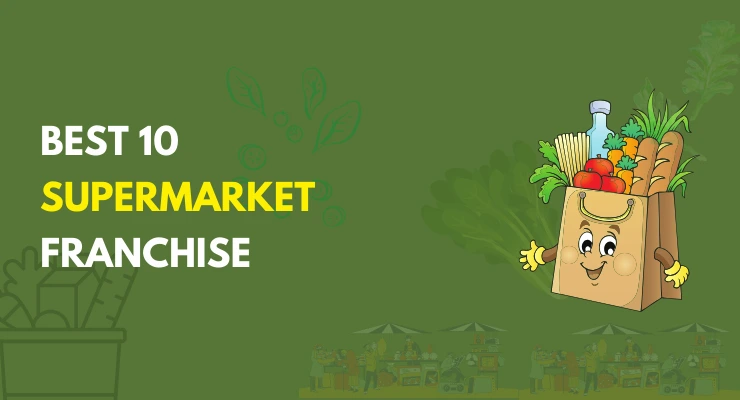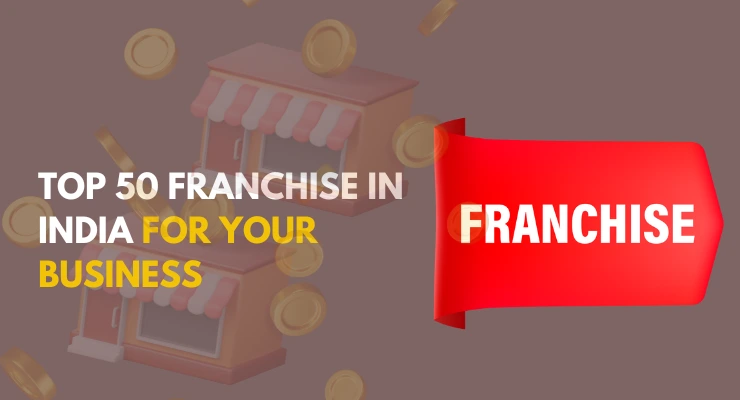
Top 10 Supermarket Franchises in India
The retail landscape in India is undergoing a remarkable transformation, fueled by rising urbanisation, increasing disposable incomes, and evolving consumer preferences.
With a burgeoning middle class seeking convenience and quality, supermarkets have emerged as essential shopping destinations.
This trend has opened up lucrative opportunities for entrepreneurs investing in supermarket franchises.
If you’re considering entering this thriving market, here’s an in-depth look at the top 10 supermarket franchises in India that stand out for their success and growth potential.
Each franchise offers unique advantages, investment requirements, and business models, catering to various customer needs and preferences.
1. G-Fresh Mart
G-Fresh Mart has quickly established itself as a reliable brand in the supermarket sector, focusing on providing fresh fruits, vegetables, dairy, and daily essentials. With a robust supply chain and a commitment to quality, G-Fres Mart aims to cater to health-conscious consumers.
Key Features:
- Franchise Fee: Approximately INR 15 lakh
- Investment Required: INR 25 lakh to INR 50 lakh
- Area Requirement: 1,200 to 1,500 sq. ft.
- Royalty Fee: 5% on sales
- Number of Outlets: Over 200 stores
Why Choose G-Fresh Mart?
- Quality Assurance: G-Fresh Mart emphasises fresh and organic produce, catering to the growing demand for healthier options.
- Support System: The G-fresh Mart franchise provides extensive training and support to its franchisees, ensuring a smooth operational process.
2. Big Bazaar
Big Bazaar is a flagship retail chain of Future Group, and it has become synonymous with value shopping in India. Launched in 2001, the Big Bazaar franchise has grown to become a leader in the hypermarket segment, offering a wide range of products, including groceries, apparel, electronics, and household items.
Key Features:
- Franchise Fee: INR 10 lakh
- Investment Required: INR 1 crore to INR 1.5 crore
- Area Requirement: 15,000 to 20,000 sq. ft.
- Royalty Fee: 6% on sales
- Number of Outlets: Over 300 stores
Why Choose Big Bazaar?
- Brand Recognition: Being a household name, Big Bazaar benefits from high footfall and consumer trust.
- Promotional Campaigns: Regular discounts and promotions attract budget-conscious shoppers hence the great Big Bazar franchise profits.
3. D-Mart
The D-Mart franchise operates on a model emphasising low prices and bulk sales. Established in 2002, it has rapidly expanded, focusing on cost-effective products across various categories. The chain’s no-frills approach has attracted a vast customer base.
Key Features:
- Franchise Fee: Not disclosed (typically operates through company-owned outlets)
- Investment Required: INR 2 crore to INR 5 crore
- Area Requirement: 30,000 to 40,000 sq. ft.
- Royalty Fee: 0% (company-owned)
- Number of Outlets: Over 230 stores
Why Choose D-Mart?
- Affordable Pricing: D-Mart is known for its competitive pricing, offering customers great value for money.
- Operational Efficiency: The company’s focus on efficient supply chain management helps maintain low costs.
4. Star Bazaar
Star Bazaar, a part of the Tata Group, merges traditional grocery shopping with modern retailing. It offers many products, including groceries, home essentials, and speciality items. Star Bazaar aims to provide a superior shopping experience with a focus on customer service.
Key Features:
- Franchise Fee: INR 12 lakh
- Investment Required: INR 50 lakh to INR 1 crore
- Area Requirement: 10,000 to 15,000 sq. ft.
- Royalty Fee: 5% on sales
- Number of Outlets: Approximately 70 stores
Why Choose Star Bazaar?
- Tata Brand Trust: The association with the Tata Group lends significant credibility to the brand.
- Diverse Product Range: The Star Bazaar franchise offers a variety of products, catering to diverse consumer preferences.
5. Reliance Fresh
Reliance Fresh is part of the Reliance Retail chain and focuses on fresh groceries, fruits, vegetables, and ready-to-cook products. With a strategic presence in urban areas, the Reliance supermarket franchise aims to offer convenience and quality to its customers.
Also read: A Detailed Guide on Building Brand Awareness for Franchise
Key Features:
- Franchise Fee: INR 20 lakh
- Investment Required: INR 30 lakh to INR 60 lakh
- Area Requirement: 1,000 to 2,000 sq. ft.
- Royalty Fee: 5% on sales
- Number of Outlets: Over 700 stores
Why Choose Reliance Fresh?
- Strong Supply Chain: Reliance Fresh franchise benefits from a robust supply chain, ensuring fresh products are consistently available.
- Consumer-Focused: The chain frequently conducts market research to understand consumer preferences, allowing it to adapt quickly to changing trends.
6. Big Deal
BigDeal is one of India’s fastest-growing retail chains. It offers a wide range of high-quality products, from everyday essentials to premium and imported goods. With a focus on creating a modern shopping experience, the BigDeal franchise provides an excellent opportunity for entrepreneurs to join a trusted and innovative brand.
Key Features:
- Franchise Fee: INR 15 lakh
- Investment: INR 60 lakh to INR 1 crore
- Area Requirement: 5,000 to 10,000 sq. ft.
- Royalty Fee: 5% on sales
Why Invest in BigDeal?
- Trusted Brand: With a growing presence, BigDeal attracts loyal customers and ensures consistent footfall.
- Extensive Product Range: From daily needs to gourmet goods, BigDeal provides a one-stop shopping experience.
- Comprehensive Support: Franchisees benefit from end-to-end support in-store setup, staff training, and marketing.
7. Reliance Retail
Reliance Retail franchise operates various formats, including grocery stores, electronics outlets, and fashion retail. With an expansive network, it has emerged as India’s largest retailer, serving millions of customers across the country.
Key Features:
- Franchise Fee: Not typically offered (mostly operates through company-owned stores)
- Investment Required: Varies widely by format
- Area Requirement: Varies widely by format
- Royalty Fee: Varies by franchise format
- Number of Outlets: More than 12,000 stores
Why Choose Reliance Retail?
- Extensive Variety: Reliance Retail’s diverse formats provide a wide array of shopping options for consumers.
- Financial Backing: As part of the Reliance Group, franchisees benefit from substantial financial resources and market expertise.
8. Walmart
Walmart, the global retail giant, entered India through a joint venture with Flipkart and focuses on wholesale formats like Best Price. The brand aims to serve small businesses, offering them access to quality products at competitive prices.
Key Features:
- Franchise Fee: Not typically offered (operates mainly through company-owned stores)
- Investment Required: Varies widely based on location
- Area Requirement: 50,000 sq. ft. and above
- Royalty Fee: N/A
- Number of Outlets: 28 Best Price stores
Why Choose Walmart?
- Global Expertise: Walmart franchise extensive global experience in retail provides franchisees with valuable insights and best practices.
- Supply Chain Efficiency: Walmart’s renowned supply chain management ensures consistent product availability and low costs.
9. Easy Day
Easy Day, a supermarket chain that focuses on convenience and local sourcing, has a strong presence in North India. The Easy day franchise targets urban consumers looking for quick and easy shopping options, emphasizing a friendly shopping experience.
Key Features:
- Franchise Fee: INR 10 lakh
- Investment Required: INR 20 lakh to INR 50 lakh
- Area Requirement: 1,000 to 2,000 sq. ft.
- Royalty Fee: 5% on sales
- Number of Outlets: Over 100 stores
Why Choose Easy Day?
- Community-Focused: Easy Day places a strong emphasis on sourcing products locally, appealing to community-oriented consumers.
- User-Friendly Store Layouts: The chain designs its stores to ensure easy navigation and a pleasant shopping experience.
10. Blinkit
Formerly known as Grofers, the Blinkit franchise has revolutionized grocery shopping in India by focusing on rapid delivery services. As an e-commerce supermarket, it caters to the on-demand shopping trend, offering a wide range of products delivered directly to customers’ doorsteps.
Key Features:
- Franchise Fee: Not typically offered (operates mainly through company-owned stores)
- Investment Required: Varies widely based on operational model
- Area Requirement: N/A
- Royalty Fee: N/A
- Number of Outlets: Online-based with a presence in several cities
Why Choose Blinkit?
- Convenience: Blinkit’s focus on quick delivery meets the demands of busy urban consumers.
- Tech-Driven: The brand leverages technology to optimize delivery routes and manage inventory effectively.
Future Trends in the Supermarket Industry
1. Sustainability Initiatives
Consumers are increasingly prioritizing sustainability in their shopping habits, prompting supermarkets to adopt eco-friendly practices. This includes reducing plastic use by encouraging reusable bags and offering alternatives to plastic packaging.
Many supermarkets are also sourcing products locally to support regional economies and reduce transportation emissions. Additionally, implementing waste management programs to minimize food waste through donations and composting is becoming common.
2. Rise of Online Shopping
The pandemic accelerated the shift towards online grocery shopping, a trend that continues to grow. Supermarkets are enhancing their e-commerce platforms to provide seamless shopping experiences, including user-friendly websites and mobile apps for easy ordering.
Click-and-collect services, where customers order online and pick up their groceries, are also gaining popularity, appealing to busy consumers.
3. The Emergence of Dark Stores
Dark stores, which cater exclusively to online shopping, are becoming increasingly popular. These stores are strategically located to facilitate quick deliveries and are designed for efficient order picking and packing.
By eliminating the need for storefront displays, dark stores can operate at lower costs, allowing for competitive pricing on online orders. Supermarkets are also investing in delivery infrastructure to meet consumer demand for quick and reliable options.
4. Technological Advancements
Technology is transforming the supermarket landscape. Supermarkets are leveraging artificial intelligence and data analytics to understand consumer behaviour, optimize inventory management, and personalize marketing efforts. The introduction of self-checkout kiosks and automated services enhances the shopping experience by reducing wait times and providing convenience.
Legal and Regulatory Considerations
This part of the blog deals with the documents required to buy the franchise in India.
- Licensing: Obtain necessary licenses and franchise registration to operate legally.
- Permits: Secure permits related to food safety and local zoning laws.
- Compliance: Adhere to retail regulations, including taxation and labour laws.
- Franchise Agreement: Draft an agreement outlining the rights and responsibilities of both parties.
- Consumer Protection: Follow laws that safeguard customer rights and ensure fair trading.
- Intellectual Property: Protect trademarks and branding elements to maintain brand integrity.
- Audits: Prepare for periodic audits to ensure ongoing compliance with regulations.
Check out this: How to Create a Franchise Operations Manual
Conclusion
The 10 supermarket franchises in India offer various options for entrepreneurs looking to invest in the retail sector. Each franchise has unique strengths, from G-Fresh Mart’s focus on fresh produce to D-Mart’s unbeatable pricing strategy.
When considering a franchise, assess the investment requirements, the area needed, and the overall brand reputation in the market. The supermarket industry is thriving, and the right choice can lead to significant profitability.
Ready to take the plunge into the supermarket franchise world? Explore your options and find the best fit for your entrepreneurial journey today!
By tapping into the thriving supermarket sector, you can be part of India’s dynamic retail growth.
Each of the franchises mentioned has the potential to help you succeed. Take the next step and make your investment count!
FAQs
1. What is the initial investment required for these supermarket franchises?
The initial investment varies by franchise. For example, G-Fresh Mart requires an investment of around INR 25 lakh to INR 50 lakh, while Big Bazaar may require up to INR 1.5 crore. It’s essential to evaluate each franchise’s specific financial requirements before proceeding.
2. How much space do I need to open a supermarket franchise?
The space requirement varies by franchise. For instance, Reliance Fresh typically needs around 1,000 to 2,000 sq. ft., while larger formats like D-Mart may require up to 40,000 sq. ft. It’s crucial to ensure you have adequate space that meets the franchise’s criteria.
3. What are the royalty fees associated with these franchises?
Royalty fees also vary among franchises. For example, G-Fresh Mart charges a royalty fee of 5% on sales, while D-Mart does not have a royalty fee as it operates through company-owned outlets. Always check the specific terms and conditions of the franchise agreement.
4. Is prior retail experience necessary to run a supermarket franchise?
While prior retail experience can be beneficial, many franchises provide training and support for new franchisees. It’s essential to have a strong business acumen and a willingness to learn, as this will help you manage operations effectively.
5. How can I apply for a supermarket franchise in India?
To apply for a supermarket franchise, you typically need to visit the franchise’s official website, fill out an application form, and submit it along with any required documentation. Most franchises also conduct interviews and site visits to assess potential locations and your suitability as a franchisee.












